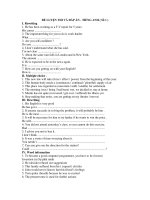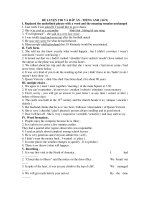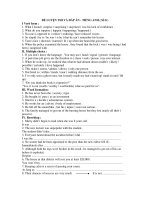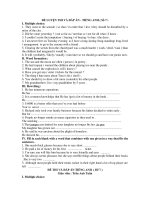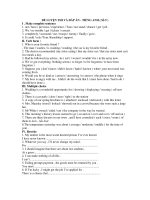ĐỀ LUYỆN THI VÀ ĐÁP ÁN - TIẾNG ANH ( Số 31 ) pdf
Bạn đang xem bản rút gọn của tài liệu. Xem và tải ngay bản đầy đủ của tài liệu tại đây (72.47 KB, 7 trang )
ĐỀ LUYỆN THI VÀ ĐÁP ÁN - TIẾNG ANH ( Số 31 )
Question I : Phonestic
a. Pick out the word whose underlined part is pronounced differently from the other
words .
1. A. boat B. road C. broad D. coat
2. A. warm B. wash C. wall D. walk
3. A. honest B. history C. hour D. honor
4. A. great B. bread C. break D. steak
5. A. look B. soon C. good D. book
1 2 3 4 5.
b. Pick out the word whose syllable is stressed differently from the others .
1. A. popular B. motion C. result D. picture
2. A. contribution B. entertainment C. individual D.
collaboration
3. A. theatre B. important C. significant D. awareness
4. A. purpose B. event C. fashion D. standard
5. A. circumstance B. education C. documentary D. imitation
1. 2. 3. 4.
5.
Question II: Put each verb in brackets into an appropriate form.
1. - Who (be) your good friends ?
- John and Peter are my good friends
2. British people (drink) more and more wine , apparently.
3. I hope Sarah will be here soon . I ( depend ) on her .
4. Please be quiet ! You (continually interrupt) .
5. Hey , you ! What ( you think ) you are doing ?
6. Could you come here please ? I (want) to talk to you now .
7. Jean, I’m so glad you’ve got here at last . I (expect) you all day.
8. - Who are you ?
- What do you mean ? I (live) here .
9. He wanted a story (tell)
10. When we (finish) building the house , we will plan the garden .
11. I hear that you (promote) . Congratulations!
12. Next weak I’m going to have the pro-singer (sing) some interesting songs which I
like best .
13. Why don’t we emigrate? If we (live) in Australia, at least the weather (be)
better.
14. I’m afraid that Smith is a hardened criminal . If we (not punish) him this time ,
he (only commit) more crimes.
15. Thank to Dr Johns , I’m still alive ! If it (not be) for her , I (be) dead for certain!
1. 2. 3.
4. 5. 6.
7. 8. 9.
10. 11. 12.
13. 14. 15.
III. Word formation
1. The housing in London and other great cities is one of the most pressing
problems of modern times
(SHORT)
2. The number of people increases daily (HOME)
3. However , as yet there seems no satisfactory (SOLVE)
4. The lack of at rents which the ordinary person can afford is disgrace to the
nation .
(ACCOMMODATE)
5. The of vast office blocks in our cities occupies valuable space that could
used for homes .
(ERECT)
6. Such blocks are frequently left and , the prices go up , They increase in
value
(OCCUPY)
7. The of those who have no where to live is ignored.
(MISERABLE)
8. This is because to convert such buildings into flats for lower-paid workers would be
for the property owners .
(PROFIT)
9. The only answer is for local people to form housing to help
themselves
(ASSOCIATE)
10. The problem, however, still remains of where they can find land for development
urban areas. (SUIT)
1. 2. 3.
4. 5. 6.
7. 8. 9.
10.
Question IV: Choose the best answer .
1. After the water workers went on strike there was a of water .
A. drain B. shortage C. loss D.
decrease
2. it was raining heavily , he went out without a rain coat.
A. In spite B. In spite of C. However D.
Although
3. As far as I’m it is quite all right for you to leave early .
A. concerned B. regarded C. consulted D.
bothered
4. I expect it will rain again when we are on holiday this year , but at least we are
properly prepared it this time .
A. about B. at C with D. for
5. If only he told us the truth in the first place , things wouldn’t have gone so wrong .
A. had B. has C. would have
D. should have
6. I know him by but I have no idea what his name is .
A. sight B. myself C. heart D.
chance
7. No child the age of sixteen will be admitted to this film .
A. before B. except C. lacking D.
below
8. Mr Smith was in a road accident .
A. wronged B. wounded C. injured D.
damaged
9. I’m not sure , but I know he has decided to accept the new job in London .
A. according B. on the whole C. as far as D. as
long as
10. You go to the dentist’s before your toothache gets worse .
A. ought to B. ought C. rather D.
better
11. of all of us who are here tonight . I would like to thank Mr. John for his talk .
A. On behalf B. On account C. In person D. In
stead
12. The brothers are so alike I can’t one from the other .
A. say B. notice C. mark D. tell
13. The police have asked that who saw the accident should get in touch with
them.
A. somebody B. someone C. one D.
anyone
14. you do better work than this , you won’t pass the exam .
A. although B. if C. unless D.
when
15. He has just taken an examination chemistry .
A. on B. about C. for D. in
1. 2. 3.
4. 5. 6.
7. 8. 9.
10. 11. 12.
13. 14. 15.
Question V: Reading comprehension
a. Fill in the gap with one suitable word
“It’s funny really I don’t feel old , but it isn’t easy to start looking for a (1)
at my age . I have had so many refusals . Now I am frightened (2) applying for a
job . All the interviewer are twenty (3) younger than me .
You see , I’m interested (4) learning a new skill , but nobody wants to
train me . I can see their point of view . I will (5) to retire in ten years . It’s
just well , I’m tired of sitting around the house . I’ve (6) hard for nearly forty
years and now I’m terrified of having nothing to (7) when I’m still with
Lancastrian Textiles I was bored (8) doing the same thing day (9) day , but
now I’d really enjoy doing a (10) again any job really . It’s not money I got
good redundancy (11) , and (12) house is paid (13) and I’ve (14)
up smoking no , it’s not just (15) I just need to feel well , useful that’s all”
1. 2. 3.
4. 5. 6.
7. 8. 9.
10. 11. 12.
13. 14. 15.
b. read the paragraph carefully and then choose the best answer below
Let children learn to judge their own work . A child learning to talk does not learn
by being corrected all the time : If corrected too much , he will stop talking . He notices a
thousand times a day the difference between the language he uses and the language those
around him use . Bit by bit , he makes the necessary changes to make his language like
other people’s . In the same way , children learning to do all the other things they learn to
do without being taught - to walk, run, climb, whistle, ride a bicycle - compare their own
performances with those of more skilled people , and slowly make the needed changes .
But in school we never give a child a chance to find out his mistakes for himself , let
alone correct them . We do it all for him . We act as if we thought that he would never
notice a mistake unless it was pointed out to him , or correct it unless he was made to .
Soon he becomes dependent on the teacher . Let him do it himself . Let him work out ,
with the help of other children if he wants it , what this word says , what the answer is to
that problem ,whether this is a good way of saying or doing this or not .
If it is a matter or right answer , as it may be in mathematics or science , give him
the answer book . Let him correct his own papers . Why should our teachers waste time
on such routine work? Our job should be to help the child when he tells us that he can’t
find the way to get the right answer . Let’s end all this nonsense of grades , exams,
marks. Let us throw them all out , and let the children learn what all educated persons
must some days learn , how to measure their own understanding , how to know what they
know or do not know .
Let them get on with this job in the way that seems most sensible to them, with
our help as school teachers if they ask for it . The idea that there is a body of knowledge
to be learnt at school and used for the rest of one’s life is nonsense in a world as
complicated as rapidly changing as ours .Anxious parents and teachers say , ‘but suppose
they fail to learn something essential , they will go out into the world and learn it .
1. What does the author think is the best way for children to learn things ?
A. by copying what other people do
B. by making mistakes and having them corrected
C. by listening to explanations from skilled people
D. by asking a great many questions
2. What does the author think teachers do which they should not do ?
A. They give children correct answers.
B. They point out children’s mistakes to them .
C. They allow children to mark their own work .
D. They encourage children to copy from one another .
3. The passage suggests that learning to speak and learning to ride a bicycle are
A. not really important skills .
B. more important than other skills.
C. basically different from learning adult skills.
D. basically the same as learning other skills .
4. Exams, grades and marks should be abolished because children’s progress should only
be estimated by.
A. educated persons .
B. the children themselves.
C. teachers
D. parents .
5. The author fears that children will grow up into adults who are
A. too independent of others
B. too critical of themselves .
C. unable to think for themselves
D. unable to use basic skills .
1. 2. 3.
4. 5.
Question VI:
a. Find one mistake in each sentence and correct it .
1. The men told the children didn’t play too loudly .
2. My little brother is much better in physics than I am.
3. He has studied in the library for eight o’clock.
4. Who makes the housework when you are both at work ?
5. This is the most interesting story I have never read .
1. 2. 3.
4. 5.
b. Rewrite each sentence , starting as shown , so that the meaning stays the same .
1. ‘Can I borrow your typewriter , Peter ?’ asked Janet .
Janet asked
2. She started working as a secretary five years ago .
She has
3.She knows a lot more about it than I do .
I don’t know
4. My French friend finds driving on the left difficult .
My French friend isn’t
5. We didn’t go on holiday because we didn’t have enough money .
If we
6. The children couldn’t go swimming because the weather was very bad .
The weather was too
7. What a pity you failed your driving test !
I wish
8. I’m always nervous when I travel by air .
Travelling
9. ‘Why don’t you put your luggage under the seat ?’ he asked .
He suggested
10. Although she had a good salary she was unhappy with his job .
In spite
Question 7 : Use these words and phrases to make complete sentences. The
sentences are all part of a letter . Make changes and add any necessary words as in
the example .
Example : After / Jim / write / letter / Mary / post.
After Jim had written the letter , Mary posted it .
Dear uncle Charlie ,
1. I/write/thank/for/cheque/you/send/me/my birthday.
2. I/decide/save/money/because/want/buy/motorbike.
3. Although I/not old/yet/have/licence/I/be able/take/test/year’s time .
4.Be/difficult/live/here/country/without/kind/transport/because/be so few/buses.
5. So/I/look forward/day/when/not have/rely/friends/lifts.
I hope to see you at Christmas when I go to London .
Yours truly, Thank you,
Question VIII : Choose the suitable preposition to fill in the gap in each sentence
1. This machine is of order .
2. The pupils in Vietnam will be keen learning English.
3. She has good knowledge history .
4. All of us have to contribute the building of our country.
5. Are you the phone ?
6. She is shy . She has difficulty talking to people she doesn’t know well .
7. He is dishonest thus nobody relies him.
8. George’s salary is very low . It isn’t enough to live .
9. He lost control of the car and crashed a wall
10. The students never complain their English teacher .
1. 2. 3.
4. 5. 6.
7. 8. 9.
10.



